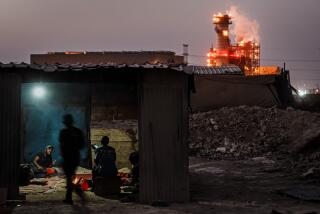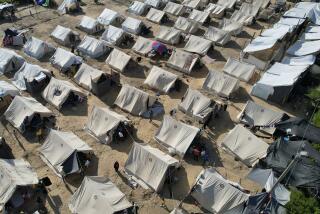Citizens of No-Man’s-Land: 3,000 Unwanted Kuwaitis : Gulf aftermath: The emirate once relied upon them. But now it doesn’t want them to come back.
SAFWAN, Iraq — The Persian Gulf War is over for virtually all its soldiers, except these few thousand men who are suspended still in a sun-baked no-man’s-land between two nations neither at peace nor at war. For them, there is no going home, because there is no home.
They are called the bidoun , or “the without,” and they have become the last refugees of the war.
As military cargo planes this week began ferrying thousands of Iraqi refugees to Saudi Arabia and Iran and hundreds of third-country refugees prepared for resettlement around the globe, more than 3,000 officially stateless Kuwaitis remained behind. They are citizens of the U.N.-patrolled buffer zone that begins three miles into Kuwait and ends six miles into Iraq.
In a Kuwait that relied heavily on these second-class citizens to staff its army and police forces, many of the bidoun were captured by Iraqi forces and held prisoner until after the war. Now, in a country that has declared itself “a new Kuwait for the Kuwaitis,” they have been prevented from returning to their homes in Kuwait and instead herded--some with their wives and children--into a dusty camp just south of the border, prisoners of Kuwait’s new declaration of independence.
For those who were born in Kuwait, who raised families there, who fought the Iraqi invaders and who left homes and belongings behind when they were taken prisoner to Iraq, Kuwait’s refusal to readmit many of the bidoun has left a company of bitter men. They spend their days crouched in low tents along the border, men for whom the stateless classification has taken on a bitter, hollow reality.
“All my life I’ve been in Kuwait, I never left Kuwait, I loved Kuwait, and now it has made me a stranger,” said Naif Saleh, a Kuwaiti army soldier who defended the emir’s Dasman Palace against the advancing Iraqi forces.
“You know, you are taken a prisoner from your country, it takes a long time, you are far away from your family and finally the problem is over and you cannot go home,” said Hamound Shamery, who served in Kuwait’s navy and was captured by the Iraqis because of his military identification card. “This is the problem we are facing. Why? I don’t know why. Because we are bidoun. “
Kuwait is a demographic casserole of complex nationality and class delineations in which the bidoun stand at the bottom. In a country where foreigners make up most of the population and only a tiny proportion of the natives are eligible to vote, where nationality means access to the emirate’s bountiful oil riches, the adjective Kuwaiti is viewed as a special term of respect.
The bidoun , many of whom originated from among the nomadic tribes of Kuwait, Saudi Arabia, Syria, Iraq and Jordan, consider themselves Kuwaitis but are not considered so under the law. Officially, they are stateless permanent residents of Kuwait without the normal privileges of citizenship. Most hold no passports or carry a Kuwaiti passport of a different color.
They numbered anywhere from 150,000 to a few hundred thousand before the occupation. Many had firm family roots in Kuwait city or the nearby community of Jahra. An estimated 60% of Kuwait’s army was made up of bidoun and a large percentage of its police force, as well. In many cases, bidoun men served out their careers in the military and security forces, and their sons have grown up to enter the military as well.
Now, some Kuwaitis have expressed fears that the close historic tribal and family ties to Iraq among many bidoun present a security risk to a Kuwait still recovering from the war. Many bidoun , they argue, actually hold passports from other countries that they have forfeited in an attempt to take advantage of Kuwait’s oil wealth. Some, they say, left Kuwait voluntarily during the occupation to visit relatives in Iraq.
As a result, most of the bidoun who were in Iraq during the war have been denied permission to re-enter Kuwait, and there are reports that the Kuwaiti government is contemplating eliminating the bidoun from service in the military and police. Hundreds have complained that they have been unable to go back to their jobs.
“Their allegiance, frankly, is to who? That’s the big question now,” said a Foreign Ministry official.
A Kuwaiti journalist said Kuwait’s only active newspaper has been prohibited from publishing the names of about 550 bidoun who were among more than 1,100 official prisoners of war released from Iraq through the Red Cross.
Those officially registered prisoners have been allowed to return to Kuwait. However, hundreds or thousands more who were released from jails in southern Iraq during fundamentalist Muslim uprisings have been held at the Iraqi-Kuwaiti border and prohibited from entering the country.
“All the bidoun who went to Iraq--now all are staying in this camp,” said Ali Mohammed Sulayman, 24. He had gone to Iraq on Jan. 8 to visit his uncle, who was taken prisoner by the Iraqis, and then stayed because his wife had given birth. After the war, the family was prevented from returning to Kuwait.
Ali Nasser, a Kuwaiti army soldier, was arrested at a checkpoint in Kuwait city in January because he had a military identification card and was taken to a jail near Nasiriyah. He was released more than a month ago by the Iraqi opposition and has spent the intervening weeks in the camp on the border, refused entry to Kuwait, where he was born.
Nasser’s brother, held as a prisoner of war in Saudi Arabia, was allowed to return to Kuwait, but his brother’s wife, his children and Nasser’s mother and aunt all are refugees at Safwan.
“The Iraqi refugees have left now,” said Nasser of this week’s airlifts to Saudi Arabia and Iran. “This settles their case. But for us, there is nothing. I lived in Kuwait, worked in Kuwait and served in jail in Kuwait. Why this happens?”
Shamery, the Navy mechanic who was arrested by the Iraqis, is living now in the camp with his wife and children, who had rented a house near the prison where he was being kept in Iraq. Now, the family lives in a small tent, with piles of garbage mounting outside. The heat has been rising past 100 degrees almost daily. U.S. Embassy officials say there have been unconfirmed cases of typhoid at the camp.
“Please, if you go to your family, please remember that many human people live here, in this sand,” Shamery said. “It’s good life for you here? So why I live here? I am human also. We can give, we can work as any person, we are useful people, if they allow us. But we have a dark future.”
Kuwait has not announced an official policy on the bidoun , and diplomats said it appears that the government is seeking to formulate a policy and a way of determining which bidoun are likely to be security risks.
“There are a lot of bidoun who fought with the resistance, who were taken prisoner, and there are a lot of people here who feel that these people should get a break,” said one Western diplomat. “But it’s a very complex issue. There are different kinds of bidoun . Many have strong connections to Kuwait, others less so. It’s not an easy problem for the government. They’re going to be very reluctant to issue a blanket approval. They’ll want to know who’s who.”
Sulieman Mutawa, the minister of planning in Kuwait’s recently deposed Cabinet, said many bidoun elected to live in Kuwait many years ago because of the benefits it offered, and the government, needing their services, neglected to do anything about it.
“They were denizens of the desert, roaming the desert, and when the grass was greener on this side of the fence, they came here and said, ‘I belong here,’ ” Mutawa said.
“We were lax, definitely, in our acceptance or rejection. We capitalized on their presence without realizing that over the years, one person gets married, has children, and one bidoun becomes five, the five becomes 5,000, the 5,000 becomes 50,000.”
More to Read
Sign up for Essential California
The most important California stories and recommendations in your inbox every morning.
You may occasionally receive promotional content from the Los Angeles Times.










